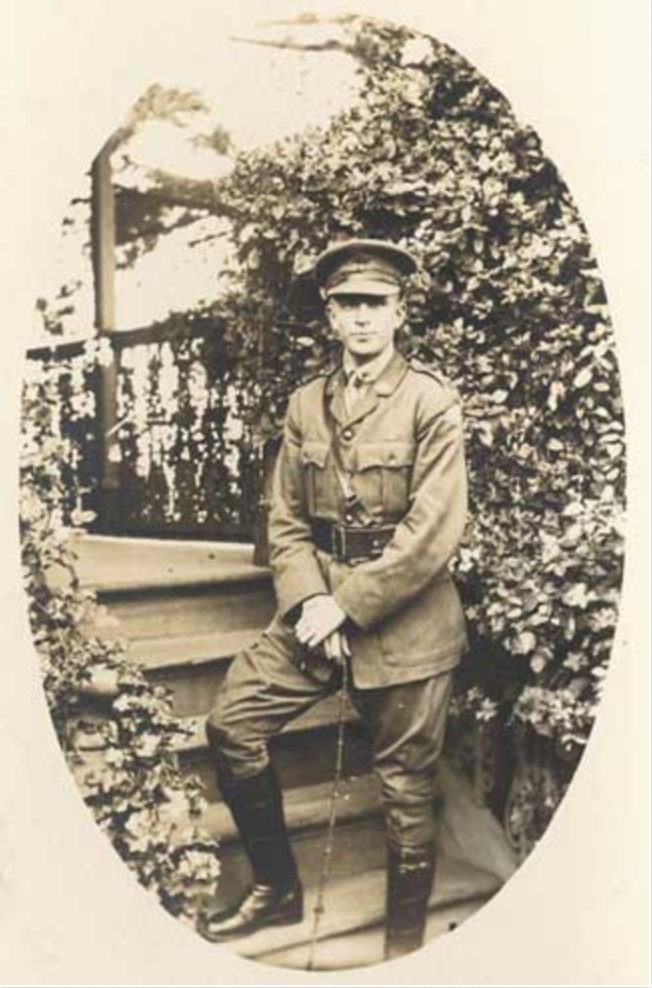One of the most remarkable ANZAC stories I’ve heard is even more memorable because of the synchronicity involved. A friend at a school reunion, after learning about my interest in synchronicity, described how his family had only become aware of details of his grandfather’s war experience at Gallipoli from a chance meeting 90 years later. His father, Robert, attended a party where the host asked whether he was related to Ashley Vines who had lost an eye when serving at Gallipoli. Indeed, Lieutenant Ashley Vines (pictured) was his father. The host, Bob Vowles, then described how his uncle, Alan Vowles, had saved Ashley’s life.
Ashley landed in the second wave of soldiers at Anzac Cove on the morning of 25 April, 1915. He advanced deep into enemy territory before being felled by a bullet near Baby 700, an area so contested that it changed hands five times in a day. Captain Alan Vowles was collecting wounded survivors from his own company amongst the many who had been killed when he came across Ashley who had lost an eye and was bleeding profusely from a severed artery. Alan went to assist the badly injured soldier and suddenly recognised that he was a former primary school friend. Being from different battalions, this was a highly improbable encounter. Over the next five hours, despite being wounded in the shoulder himself, Alan Vowles helped Ashley crawl and then stagger almost five kilometres back to Anzac Cove under heavy gunfire.
Ashley remembered little of this journey. Like many war veterans he never divulged any details of his war experience to his family. The only thing his son recalled him saying about the war was that General Ataturk was a remarkable human being. However, Ashley was recorded elsewhere as having admired Alan Vowles “quiet practical thoughtfulness”, even from primary school days. These characteristics of his childhood friend, combined with extraordinary courage, had subsequently saved his life.
A remarkable related coincidence occurred almost a century later. Ashley Vines’ great-grandson, also called Ashley, was sorting through his school vice captain’s desk on his first day back at school when he came across a photo of school prefects from 1910. He was surprised to see his great-grandfather in the photo. The Vines family then learnt for the first time that Ashley Snr had also been the school’s vice-captain, exactly 100 years before his great-grandson and namesake was appointed to the same role. Ashley Jr had encountered this photograph completely at random. Nobody had purposefully put it there. The family would likely never have learnt otherwise of this coincidence as an official record of vice captains was not kept until 1912, two years after Ashley Snr held the role.
The traumatic impact of Ashley Snr’s experience was evident in his service record stating that he suffered from “mental deficiency from shock”. Despite this affliction, he attained a science degree and became a teacher. He subsequently became the founding headmaster of the new Hawthorn campus of Scotch College, later moving to Scots Wellington in New Zealand, St Peters in Adelaide and Huntingtower School in Melbourne.
His rescuer and unsung hero Vowles, who according to Ashley’s mother deserved a Victoria Cross, died in his 30’s of war-related injuries. It was only the chance meeting between descendants at a party nearly 100 years later that led to Vowles’ heroic actions becoming widely known. Partly owing to the remarkable synchronicity involved, this story was featured on 60 Minutes around the centenary of the Gallipoli landing. (see 60 Minutes story here).
As a therapist who has specialized in trauma and seen many war veterans, I can’t help but suspect a concealed signature of post-traumatic stress in Ashley Snr’s story. He likely suffered much more distress than would have been externally visible, especially in an era when trauma reactions were little understood. It likely had an impact on Ashley’s relationships – perhaps one manifestation being that he never shared these matters with his only son Robert. This is so often the case for individuals grappling with the effects of war-induced trauma.
Fortunately, this story has an uplifting ending. Ashley Snr’s descendants have gone on to also excel in school sport, leadership, and subsequent professional roles, including an Oxford professorship. By coincidence, I recently learnt that a widely respected psychologist I’ve long known of was another of Ashley Snr’s descendants. Family members seem to share an ethos of contributing strongly to their communities. To me, this is ultimately a story of cross-generational resilience and growth in the wake of severe trauma.
ANZAC Day is a time to reflect on the often hidden ramifications of trauma, the sacrifices that so many have made – including their families – and the resilience of the human spirit.
(Click below for a radio segment about this story involving Richard Vines, Ashley Vines Snr’s grandson, on 93.9 Bay FM Geelong on 26th April, 2017)
Chris Mackey is principal psychologist at Chris Mackey and Associates, Geelong, and author of The Positive Psychology of Synchronicity: Enhance Your Mental Health with he Power of Coincidence. For other radio segments about synchronicity, click here.

